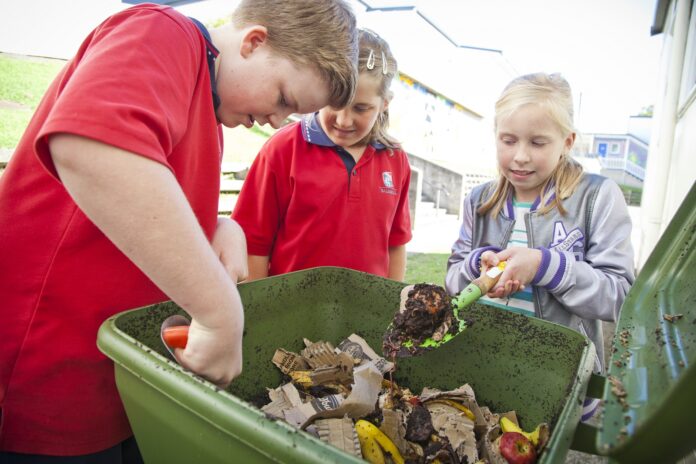Source: Auckland Council
Perhaps no one is more excited for back to school than the hungry worms that have missed the banana peels and bread crusts in school lunches lovingly packed by parents across Auckland.
Worm bins are a popular option for schools aiming to reduce their waste. That’s why Auckland Council has awarded 66 schools with Waste Minimisation Innovation Fund (WMIF) grants to help them get composting.
The average award of approximately $2600 also covers other zero waste infrastructure the school might need, like sorting stations, signage, or bokashi bins. Often, worm bins are one key step in their zero waste journey, with garden to table and Enviroschools projects. In the past six years, more than $130,000 has been awarded to schools across Auckland for these waste minimisation initiatives.
Local school partners
Hay Park primary school in Mt Roskill upgraded their worm bin capacity to account for the additional food scraps from offering a free breakfast for their 180 students. Teacher Dianne Macdonald identified the need for this zero waste solution.
“We are very future-focused and are always looking at ways to reduce and recycle our waste in our school community.”
Eriko Taingahue from Waitakere primary school in Bethells Beach sees their worms as a great way to get rid of the leftovers from their ‘brain food’ fruit breaks each day.
“We live in such a beautiful clean part of Auckland. Looking after our school environment is a natural extension of what people already do at home and is part of our core school values.” The worm tea is a popular fundraising item for their school.
How it works
Tiger worms can eat their weight each day, and just like kids, worms will eat their preferred food first but like to have some variety. If the food is high in preservatives it won’t harm your worms, but they will avoid them. This makes worms a great companion for the picky eaters who chomp through the biscuits and muesli bars in their lunch boxes but get full before starting the apples, carrots, or bananas. They will eat scraps of paper, but not enough to feed them your homework assignment.
Worms are also great company because they are not fussy about their location and need no light to thrive. They’re happy to live under a carport or deck, or even in the basement of Auckland Council, where more than 75 worm bins are hard at work turning lunch scraps into worm tea for gardens all over town.
“Removing food waste from landfill ranks high on the list of things individuals can do to mitigate the climate crisis,” Councillor Richard Hills, chair of the Environment and Climate Change Committee reminds us.
“The average family throws away nearly three shopping trolleys of food every year. That’s around $644 of wasted food per family. Worm bins, at home or school, are a simple act to help us think more about the waste we create.”
Schools or families can get hands-on composting help and discounts from the Compost Collective, a project sponsored by Auckland Council.
If you are interested in applying for WMIF funding, further information is available online, including lists of previous award recipients.



